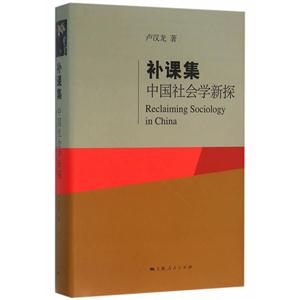补课集-中国社会学新探 版权信息
- ISBN:9787208135970
- 条形码:9787208135970 ; 978-7-208-13597-0
- 装帧:暂无
- 册数:暂无
- 重量:暂无
- 所属分类:>
补课集-中国社会学新探 本书特色
本书循着20世纪80年代中国恢复社会学教学和研究以来的轨迹,记录和展示了该学科在理论补课和实践发展中的足迹。全书多方位地提供了中国社会学新探索以来的成果:从社会学如何走出历史阴影,确立起独立社会科学学科地位开始,用社会学的视野对中国当代社会变迁提供了独到的理论认识,同时通过一系列深入的社会调查来报告各种社会学议题的研究发现。作者特别关注草根社会从社区到社团的现代化发展进程,并提供了社会学研究如果应用于公共政策和社会治理,发挥思想智库作用的经验。
补课集-中国社会学新探 内容简介
卢汉龙是中外很少见到的接合社会学研究与社会管理需求的学者。他做研究:谨慎思考理论背景和布局,仔细挑选主题,精心设计问卷和指标,同时运用质与量的田野方法,兼顾中外学术考量,紧扣当前社会政策和管理议题需要。三十多年来,锲而不舍,埋头耕耘。欣见《补课集》,让学者、管理工作者和关心社会的读者,分享其成,实为应用社会学的典范与楷模。
补课集-中国社会学新探 目录
自序............................................................................................................1**篇.理论方法篇——社会学的“基”与“本”...............11.1 马克思主义社会学和其他社会学.........................................21.2 社会学是研究社会整体的科学..............................................91.3 中国人调查中国社会的**次尝试................................... 171.4 社会调查的科学性与程序性................................................ 201.5 调查问卷的意义界定............................................................ 241.6 论社会指标的基本问题........................................................ 321.7 论中国社会学的理论建设.................................................... 471.8 迎接中国社会学的春天........................................................ 56第二篇.基本认识篇——社会学视野看中国变迁................ 602.1 论城市居民社会地位的认同................................................ 612.2 单位制与住房商品化............................................................ 732.3 从“墙头经济”看中国产权文化....................................... 932.4 中国社会主义实践的三大转变.......................................... 1092.5 消费文化与消费革命.......................................................... 1362.6 关于社会结构理论的反思.................................................. 1522.7 人力资本与阶层分化..........................................................1732.8 全面“小康”与中国“中产”............................................1812.9 转型社会研究.......................................................................196第三篇.调研报告篇——来自社会的经验研究..................2053.1 社会指标与生活质量研究..................................................2053.2 上海市民生活质量报告......................................................2373.3 角色压力与精神健康..........................................................2733.4 上海解放前移民研究..........................................................2923.5 中年人的家庭与职业..........................................................3053.6 收入差距与社会不平等......................................................3303.7 就业市场和中国市场化转变..............................................3353.8 企业的社会角色与捐赠行为..............................................350第四篇.草根社会篇——从“社区”到“社团”的发展....371 4.1 社区组织与基层政权..........................................................3724.2 单位与社区...........................................................................3804.3 社区文化建设的思考..........................................................3874.4 城市社区的治理模式分析..................................................4024.5 民间组织与社会治理..........................................................4204.6 社会组织的发展与能力建设..............................................431第五篇.公共治理篇——社会学研究的应用.......................4505.1 管理城市就是管理发展......................................................4505.2 加强应对老龄化...................................................................4745.3 提高人大制度的“公民性”................................................ 4775.4 城市旧区改造中的社会机制.............................................. 4815.5 社会政策转型研究.............................................................. 4895.6 社会管理创新....................................................................... 5025.7 法治管理的社会基础.......................................................... 5235.8 实现政府的现代化转型...................................................... 5335.9 基层社会的治理结构.......................................................... 543contentspreface .....................................................................................................................1part 1: sociology theory and methodology ...............................................11.1 marxist sociology and other theories.................................................21.2 re-exploring the holistic approach to studying the society.............91.3 the first attempt of chinese to survey their own society............... 171.4 the scientific procedure for survey research ..................................201.5 defining the measurement of survey questionnares........................241.6 examing social indicators...................................................................321.7 examining the intellectual environmnet for building sociology theory in china..................................................................47 1.8 embracing the spring blossom for china’s sociology.....................56part 2: a basic understanding of chinese society ................................602.1 the study on urban residents social status.....................................612.2 the“danwei”system and real estate commercialization.............732.3 “wall economy”and collective socialism.......................................932.4 three major transitions in china’s socialism experiment .............. 1092.5 the consumption culture and consumer revolution ....................1362.6 reflections on china’s social structure theory..............................1522.7human capital and china’s social stratification and development capacity.......................................................................173 2.8 an“all around xiaokang”society and the study of chinese middle class ........................................................................181 2.9 the study of social transition .........................................................196part 3: reports from the society: social indicators and quality of life....................................................................................205 3.1 exploring the structure model for social indicators and quality of life....................................................................................205 3.2 social reports from individuals .......................................................2373.3 social roles and mental health........................................................2733.4 studying shanghai immigrants before the new china ..................2923.5 the“transitional”generation in market transformation................ 3053.6 citizens report:income gap and social inequality.......................3303.7 the formation of labor market and changes in employment opportunities ...............................................................335 3.8 property rights reforms and corporate social responsibility......350 part 4: grassroots development: from community to associations ........................................................................................371 4.1 the rebuilding of community associations and grassroots governance......................................................................372 4.2 “danwei”and community:the reorganization of social life in urban china ...........................................................................380 4.3 building a community culture under economic diversification..387 4.4 the governance model of chinese urban communities ...............4024.5 social organizations and social governance ..................................4204.6 building capacity for china’s social organizations ......................431part 5: social policy and public governance..........................................4505.1 governing a city is governing its development ............................4505.2 increasing social reserves for an aging society............................4745.3 enhancing“civic chateristics”for the people’s congress system.................................................................................................477 5.4 the role of social mechanism in renovating old cities ..............4815.5 social policy in transition:from eliminating inequality to essential elements in productivity ...................................................489 5.6 the pursuit of excellence in social governanc innovations..........5025.7 the role of law needs to be based on a civil society .................5235.8 modernizaing the government, promoting reforms and innovations of the governance system............................................533 5.9 the reform of grassroot governance needs to begin from community reengineering................................................................543
展开全部
补课集-中国社会学新探 相关资料
汉龙的《补课集:中国社会学新探》,是他用一生的学术道路和奋斗足迹完成的新作,从中可以品味出中国社会学家的坎坷和成就、智慧和超越。他的作品反映了一代中国学人的探索追求,也反映了改革开放以来中国社会学的品格特征,那就是经世致用的文人担当,对大众民生的始终关注,“为了中国”的毕生情怀。中国社会科学院副院长 李培林研究员卢汉龙的学术生涯致力于对日常生活严谨的分析来探究中国社会变化的原动力。怀着求知的欲望和对广阔社会的深沉关切,卢教授不断地对近现代中国社会研究作出奠基性的贡献。通过这本《补课集》的中国社会学新探索,当代读者乃至未来的学人们都能从这位卓越学者的睿智和洞察力中获益匪浅。 美国耶鲁大学社会学系 戴慧思(deborah davis)教授
补课集-中国社会学新探 作者简介
卢汉龙,上海社会科学院社会学所研究员,中国社会学会学术委员会委员。曾担任上海社会科学院社会发展研究院院长(2001-2009),社会学研究所所长(1994-2009),上海市人民代表大会代表(1993-2013),上海市人民政府参事(2006-2013)。曾多次到欧美大学和研究机构做学术访问和开展合作研究。应邀担任英国社会学会《社会学》(Sociology)杂志国际编委,香港《中国评论》(The China Review)编委和香港人文社会研究所顾问。





















